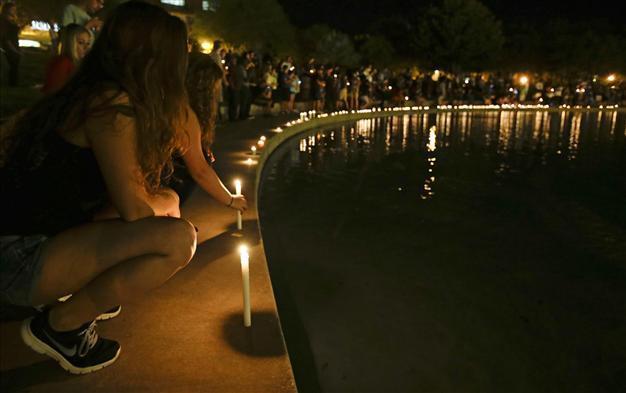Steven Sotloff's family mourns beheaded son as a 'gentle soul'
MIAMI - Reuters

Students and supporters place candles at the edge of a wall surrounding a pond as they take part in a candle light vigil at the University of Central Florida, Sept. 3. AP Photo
The family of Steven Sotloff, the second American journalist beheaded by Islamic State in Syria and the Levant (ISIL) militants, said on Sept. 3 he was no hero and no war junkie but "a mere man who tried to find good concealed in a world of darkness."
Barak Barfi, a friend of Sotloff who is serving as a family spokesman, read a statement from the family remembering the slain journalist as a "gentle soul" - a fan of the NFL's Miami Dolphins who was fond of junk food, enjoyed the TV series "South Park" and liked to talk to his father about golf.
The statement said the 31-year-old Sotloff was "torn between two worlds" but "the Arab world pulled him."
"He was no war junkie. He did not want to be a modern-day Lawrence of Arabia. He merely wanted to give voice to those who had none," Barfi said outside the family's one-story home in a leafy Miami suburb. "... He ultimately sacrificed his life to bring their story to the world."
The Islamic State group that has captured territory in Syria and Iraq released a video on Sept. 2 of Sotloff being beheaded. U.S. officials confirmed its authenticity on Sept. 3. President Barack Obama vowed to "degrade and destroy" the group.
The other American hostage killed in recent weeks in retaliation for U.S. air strikes against Islamic State forces in Iraq was journalist James Foley, who was shown being beheaded in a video released on Aug. 19.
Sotloff was a freelance journalist who traveled the Middle East writing for Time magazine and Foreign Policy magazine among others.
"Steve was no hero," the family statement said. "Like all of us, he was a mere man who tried to find good concealed in a world of darkness. And if it did not exist, he tried to create it. He always sought to help those less privileged than himself, offering career services and precious contacts to newcomers in the region."
Sotloff was kidnapped in Syria in August 2013 after he drove across the border from Turkey.
"We Americans want to tend to our own lives. Work our jobs, farm our farms. But time and time again, we are sucked into world crises and often perplexed about which policies to pursue and criticized for what we choose," the statement ready by Barfi, a research fellow at the New America Foundation think tank in Washington, said.
Sotloff grew up in the Miami area, attended boarding school in New Hampshire and studied journalism at the University of Central Florida from 2002 to 2004 but never graduated. A spokesman for Israel's foreign ministry said on Twitter Sotloff also was an Israeli citizen.
His family said Sotloff "yearned for a tranquil life where he could enjoy Miami Dolphins games on Sunday and a banal office job on Monday that would provide a comfortable middle-class existence."
"Today we grieve. This week we mourn. But we will emerge from this ordeal. Our village is strong. We will not allow our enemies to hold us hostage with the sole weapon they possess - fear," the family statement said.
